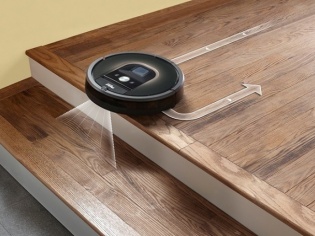-
RMR
10:40 19th May, 2016
Google May Go Gaga On AI, But... | TechTree.com
Google May Go Gaga On AI, But...
...Stuff like this hasn’t done much for the home.

This is entirely inspired by a superior article I recently saw on Vox: Why robots and smart technology aren’t revolutionizing your house.
In my defence, I must say that I’ve often thought about the Roomba. It’s not ridiculously expensive, and depending on conditions, it can do the job well. It’s also cool. And the sales haven’t been bad either, since its debut in 2002. But why do the vast majority of vacuum cleaner-users in the world not use Roombas?
Timothy Lee of Vox elaborates: 2.4 million sold in 2015 in the US, which has a population of 300+ million.
“‘It gets stuck a lot’; ‘I can't really leave it at home unsupervised’; ‘it (drives) up the table’s leg and (gets) stranded’; (it) terrifies (the) dog.”
Here’s the key, and we’ll tie these together later: “I still have to tidy up the room before letting the Roomba loose.”
iRobot, the company that makes the Roomba, “built a couple of mopping robots, a pool-cleaning robot, and a device for cleaning out your gutters. None of them have been big hits. Other companies have tried to create internet-connected lawn sprinklers... and lightbulbs.”
Here’s another key: “The home appliances that have done the most to improve people's lives are the ones like dishwashers and washing machines that took a really time-consuming and tedious task and made it dramatically faster.”
If you’re male, think about automatic-flushing urinals. You’ve seen good ones, the ones that flush as soon as you leave — and you’ve seen bad ones, the ones that you need to stare at to make sure it’ll flush. Why? Because human behaviour is unstructured.
Then, think about what kind of device really adds value. Say you get one of those central electricity control thingies, where you can switch on and switch off any appliance in the house. If the house is small, they don’t really help; if the house is large, you’ll have situations where someone comes asking why you switched off something.
Home surveillance: Can you trust a surveillance camera to take care of a baby? You can keep a watch, but you’d have to constantly keep looking at the feed. If you become dependent on the device, you might forget. In comes AI, and you say you want a device that will define dangerous areas and dangerous body positions. How hard would that be to define, and how confident can you be that it’ll work?
The problem for AI and “smart technology” is that humans are disorganised. I’m sure a Roomba would work with 99 percent efficiency on a factory floor after the employees have left (and if the floor plan could be programmed into the thing). But in the home or office, with clothes lying around and such, Roombas remain a useful toy.
As Mr Lee says, “washing machines and dishwashers are useful because you can wash dozens of dishes or shirts at the same time. And because all the action happens inside the machine, there's less room for unpleasant surprises.”
If machines are to be somewhat human to be more useful, we need to be somewhat machine-like to make them useful. We need to meet them halfway. We can’t let them do their thing in our unstructured world.
- DRIFE Begins Operations in Namma Bengaluru
- Sevenaire launches ‘NEPTUNE’ – 24W Portable Speaker with RGB LED Lights
- Inbase launches ‘Urban Q1 Pro’ TWS Earbuds with Smart Touch control in India
- Airtel announces Rs 6000 cashback on purchase of smartphones from leading brands
- 78% of Indians are saving to spend during the festive season and 72% will splurge on gadgets & electronics
- 5 Tips For Buying A TV This Festive Season
- Facebook launches its largest creator education program in India
- 5 educational tech toys for young and aspiring engineers
- Mid-range smartphones emerge as customer favourites this festive season, reveals Amazon survey
- COLORFUL Launches Onebot M24A1 AIO PC for Professionals







TECHTREE